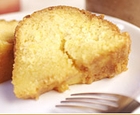|
Caribbean Dessert Pineapple Rum Cake This sweet concoction is to die for. End of story. (Wait till you see what's in it.)
Cake: Cream butter and sugar together in a large mixing bowl. Add eggs, one at a time, beating to incorporate before adding the next. In a second bowl, combine flour, baking soda and salt. In a third bowl, combine buttermilk with rum and pineapple extracts. Add a bit of flour mix to sugar-butter mix and stir. Add a bit of the buttermilk and stir. Alternate between flour and buttermilk mixes, adding them gradually to sugar-butter mix. End with flour addition. Finally add the pineapple. Pour batter into cake pans and bake for 25 minutes, or till a toothpick comes out clean. Allow cakes to cool before taking them out of their pans. Stack them and dust with confectioners sugar and grated coconut. Glaze: Or make the glaze by combining all 4 glaze ingredients in a saucepan and bringing to a boil over medium heat. Cook for 5 minutes and drizzle over the cake (and between layers) while cake is still warm. |
Tips & Glossary Caribbean cuisine is an exquisite blend of African, Asian, European, and Carib Indian (the area's original inhabitants) foods. Dishes are highly seasoned, either with a dry rub or marinade —or both. Below are some typical ingredients found in Caribbean food. Callaloo: young leaves of either the taro root plant or amaranth; used widely in Caribbean cooking. Spinach can be used as a substitute. Spices: Allspice, bay leaves, black pepper, chives, chili peppers, cilantro, cinnamon, coconut, curry powder, escallion, garlic, ginger, lime, mace, nutmeg, onion, oregano, sugar, thyme, orange, tomato paste, vanilla, cayenne (red) pepper. Jerk: Jamaican cooking method in which meat is rubbed, prior to grilling, with a blend of seasonings, often firey hot. • 1 T each—onion powder, garlic powder, dried chives, brown sugar; 2 tsp. each— (ground) allspice, nutmeg, cinnamon; 1 tsp. each—sage. thyme, salt, black pepper, cayenne (or more to taste). Mix thoroughly and store in a tightly covered jar. There are thousands of versions; figure out what flavors you like most and add or subtract accordingly. Typical meats: goat, pork, chicken, and some beef (though beef has tended to be expensive). Fish: varieties that abound in surrounding waters, some familiar to us—grouper, cod, tilapia, blue marlin; others not so—200 species of jack, chip-chips (tiny clams), casadura (primitive armored catfish). Native plant foods: More familiar foods:
|

